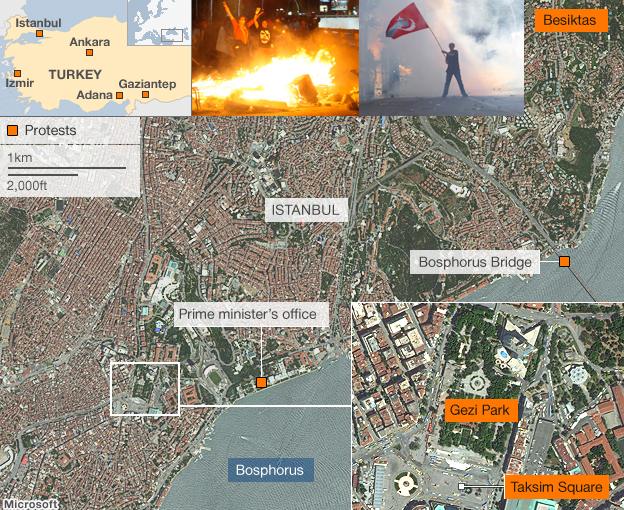Turkish government says it may use army to end protests
- Published
Anti-government protests continued in Istanbul and Ankara on Sunday night
Turkey's government has said it could use the military to end nearly three weeks of unrest by protesters in Istanbul and other cities.
Deputy Prime Minister Bulent Arinc told A Haber TV that the state would use "all its powers" and the armed forces if necessary to "establish peace".
It is the first time the ruling Justice and Development (AK) Party has raised the prospect of deploying troops.
Later, Mr Arinc complained that his comments had been taken out of context.
On Sunday, Prime Minister Recep Tayyip Erdogan told hundreds of thousands of supporters at a rally in Istanbul that the protesters had been manipulated by "terrorists".
Trade unions have called a strike to protest against the police crackdown on demonstrators which has seen some 500 people arrested.
Medical officials estimate that 5,000 people have been injured and at least four killed in the unrest.
The protests began on 28 May against a plan to redevelop Istanbul's Gezi Park, on the city's central Taksim Square, but it snowballed into nationwide anti-government protests after the perceived high-handed response of the authorities under their three-term prime minister.
Gendarmes
In an interview with A Haber, a Turkish news channel, Mr Arinc insisted that "the innocent demonstrations that began 20 days ago" had "completely ended".
Any further demonstrations would be "immediately suppressed", he added.
"Our police, our security forces are doing their jobs," he said. "If it's not enough then the gendarmes will do their jobs. If that's not enough... we could even use elements of the Turkish armed forces."
The deployment of gendarmes - a military unit under control of the interior ministry in peacetime - shocked some protesters in Istanbul this weekend.
Mr Arinc later wrote to the BBC, external to complain that the TV interview had been "taken out of context" and "created the misperception that the Turkish government might use its army and all its forces to suppress the protests".
"The AK Party would never consider declaring a state of emergency or anything similar," he added. "The powers that we are entitled with are sufficient to settle such events.
"When a societal event breaks out in a region, our governors are responsible for restoring order and security. In such a case, they deploy firstly police forces, then gendarmeries. If the incidents become widespread, armed forces might be also called on the governor's order to establish peace."
In a separate interview, Interior Minister Muammer Guler also stressed that he had not called on the army to help police the protests.
But he argued that the use of the gendarmerie was "quite normal", the Turkish newspaper Hurriyet reported, external.
Bloggers reacted with scepticism to news that the army might be deployed. "And this coming from the same people who always claim they liberated Turkish democracy from army intervention," one wrote.
In the capital, Ankara, riot police could be seen facing off with trade union activists on Monday.
Police officers used megaphones to order workers to stop their march towards the central Kizilay district, reports Reuters news agency.
The Confederation of Public Workers' Unions (KESK) and Confederation of Progressive Trade Unions (DISK), along with three professional organisations, announced a one-day work stoppage on Monday to demand an end to "police violence".
